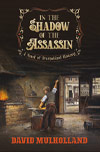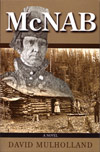
Click on either book cover for more information. |
|
The story is told from the first person and third person points of view. Here is the beginning: I AM MALCOLM Kenneth MacGregor, Piper to the Laird of McNab, 13th Chief of Clan McNab. It grieves me to tell ye, grieves me to even think . . . the Laird's domain in the Highlands of Scotland once stretched from Tyndrum west into Argyll and east down Glendochart to Killin where the stately McNab Castle stood with majestic pride on the island of Eilean Ran on the north bank of the River Lochay. Alas, the glory of those days is no more. Aye! tis true! Sir Henry Raeburn's portrait of Francis immortalized my Chief's predecessor, a striking figure attired as a Colonel of the Breadalbane Volunteers. Ah, but tis also true, Francis, rogue that he be, fathered many a lad and lassie, but never took a wife. And he had a grand liking for the bottle! His unconscionable neglect left our clan a debt of some thirty-five thousand pounds, our estate lands so hopelessly encumbered, his nephew, my Laird, could not save them. His legal position tenuous, at best, the McNab had no choice but to abandon his beloved estates and flee the country. I tell ye, twas most humiliating — most humiliating indeed! Twas a trying time for my Chief, the McNab already grieving from the departure of Margaret and the children. Why the marriage failed, I canna say. The Laird, spontaneous and uplifting in spirit, is a private man in matters of the heart. There was talk of his frequenting the brothels in Paris, but . . . nay, I canna say. Ah, but I can attest to the Laird's resolve! He be a man of tenacious character and much innovation. On our voyage to this new land, he spoke often of his plans to build a settlement of his clansmen. He told me with great relish how he intends to accumulate adequate wealth to pay his debt and return home in triumph. His first order of business: reclaim his estates from the Earl of Breadalbane, that shameless rascal who seized McNab lands upon the Court of Session issuing a writ of foreclosure. I am grateful to the Almighty that on our voyage across the Atlantic—although tiring and in accommodations considerably less pristine than that to which we are accustomed—the forty-nine days went by without incident. In our leisure, we reminisced, expounding for hours on the long and noble tradition of the Scottish clans, a topic of which I never tire. . . . Time vanished as the McNab and I harkened back to ages past. When the harbour at Quebec came into view, ye could hear a collective sigh of relief. Aye, a riotous cacophony ensued as passengers scurried about preparing to disembark. While descending the gangplank, we witnessed a scuffle between a Canadian and a Highlander. The former, a porter, was attempting to be of assistance by loading the latter's trunk on to a little cart. Ah, but the Highlander, apparently thinking the man was attempting to rob him, swore at him in Gaelic. Although ignorant of the language, the Canadian could not mistake the tone and replied with a volley of curses in French. The incident attracted a small crowd who chuckled at the spectacle. After a brief tug-of-war, the Highlander wrestled his trunk from the hands of the caddie and, with the assistance of his three sons, carted it off. The McNab and I had no time to dally. We immediately boarded a steamer for the journey up the St. Lawrence to Montreal. The novel contains copies of authentic documents. Here's McNab's letter to Dr. Hamilton Buchanan: Kinnell Lodge, My Dear Leney,—From my last letter you will have gleaned what my intentions are, and of the progress I have made. Now I am happy to inform you that all my arrangements for settlement are complete. The township of McNab has to-day been handed over to me by Sir Peregrine, and it contains 80,000 acres of fine, wooded, arable land – and upwards. You will send out to me, according to your offer, twenty families at first. Give them three months' provisions, and make each head of a family, before you give him a passage ticket, sign the enclosed bond, which has been specially prepared by the Attorney-General. I will meet the settlers in Montreal, and see each one on the land located to them, and will provide for their transport to their lands. They should embark early in April, and I should feel obliged if you would personally superintend their embarkation at Greenock. Now I am in a fine way to redeem the estate at home, and in a few years will return after having established a name in Canada, and founded a translantic colony of the clan. The preparations can be all made this winter for their emigration, and I shall be fully prepared to receive them. I have a large log house erected close to the banks of the Ottawa, which, as you will see by the heading of this letter, I have called after my estate on Lock Tay, &c., &c. McNab Here's a sample of the story in the third person, the settlers' point of view: HIS DAY'S WORK done, Donald Cameron stood outside the door of his stone cottage and thrust his shovel into the damp earth. Before him lay the barren, rock-infested patch that had yielded the fall's meagre potato crop. He tugged at his trimmed whiskers. Not for the first time, worry seized his mind. He was wondering how his family could survive another winter when the bleating of sheep intruded upon his thoughts. Beyond the hedge of choppy boulders that partitioned his miserable holdings, he could see the black faces of Lintons and the thick, knotted coats of Cheviot ewes. They were grazing on hilly pasture—pasture he had once farmed. “Donald, supper,” Elizabeth Cameron called to her husband through the open window. “Aye.” From inside he could hear the voices of his two young children as they sat down for the evening meal. What of their future? His father's Laird had followed the practice of generations of Highland chiefs and allowed his tenants to hand down a portion of their small crofts adequate enough to raise a few cattle and plant a few crops. Then came the Clearances. Now the Camerons drew sustenance from whatever Elizabeth's imagination could do with salted herring and greying potatoes garnished with aqueous butter from their one bony milch cow. When the Laird dismissed his tacksman—a nephew who rented land from his uncle and sublet to the crofters—the man uprooted his family and emigrated to America. Several of Cameron's neighbours followed and encouraged him to do the same. But Donald thought it inconceivable to abandon his family's steadfast allegiance to a history that dated back several centuries . . . As he turned towards the cottage door, the bleating of sheep drew his attention once more to the rolling hills beyond. The landlord's shepherd was leading more ewes into pasture. A wave of nausea rolled through his body. His narrow, angular jaw tightened and he tugged at his brown beard. The Perthshire Emigration Society was meeting that night at Leney House in Callander, the home of the society's chairman, Dr. Hamilton Buchanan. Many of Cameron's neighbours said they would attend. He pushed open the heavy wooden door, bowed his lanky frame and entered. |
|
David Mulholland is published
by
Burnstown Publishing House - www.burnstownpublishing.com |
|
Website designed by halicamedia
© Copyright, David Mulholland. No part of this website may be reproduced without permission. |



